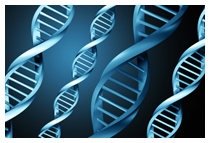
Applied DNA expands patent portfolio
Applied DNA Sciences, Inc., a provider of DNA security solutions, announced today that it has successfully marked over 500,000 pounds of raw cotton fibre with a naturally derived botanical marker called SigNature DNA, as part of a pilot study conducted in collaboration with one of America's largest cotton growers. SigNature DNA was detected homogeneously throughout the various stages of cotton processing, before and after baling, right down to the single cotton

2nd June 2009
Innovation in Textiles
|
Stony Brook, NY
 Applied DNA Sciences, Inc., a provider of DNA security solutions, announced today that it has successfully marked over 500,000 pounds of raw cotton fibre with a naturally derived botanical marker called SigNature DNA, as part of a pilot study conducted in collaboration with one of America's largest cotton growers. SigNature DNA was detected homogeneously throughout the various stages of cotton processing, before and after baling, right down to the single cotton fibre. The persistence and stability of the SigNature DNA marker ensured that it was successfully authenticated.
Applied DNA Sciences, Inc., a provider of DNA security solutions, announced today that it has successfully marked over 500,000 pounds of raw cotton fibre with a naturally derived botanical marker called SigNature DNA, as part of a pilot study conducted in collaboration with one of America's largest cotton growers. SigNature DNA was detected homogeneously throughout the various stages of cotton processing, before and after baling, right down to the single cotton fibre. The persistence and stability of the SigNature DNA marker ensured that it was successfully authenticated.
The inclusion of SigNature DNA at such a large scale is the largest deployment of a commercial DNA marker to date. This work is a complement to the tracking of cotton's native DNA in APDN's Biomaterial Genotyping platform, known as ‘FiberTyping’. By authenticating native DNA, APDN ensures that a retail product contains the cotton claimed on the label. Native DNA can also be used to determine the cultivar, and hence the country, from which the original cotton was derived. SigNature DNA markers would allow a specific farmer of natural fibres or a producer of synthetic fibres, to track specific batches of fibre through to finished textiles and apparel.
Jeff Elder, Chairman of Supima, who represent the growers of American pima cotton, stated: "We strive to assure quality products in a cost effective manner. Authentication of cotton fibre in finished products provides us with a leading edge in today's highly competitive global marketplace."
Annual business revenue stimulated by cotton in the US economy exceeds $120 billion, making cotton America's number one value-added crop (National Cotton Council). Cotton is the dominant fibre in apparel, having captured two-thirds of that market; cotton towels remain enormously popular with consumers; and 100 percent cotton sheets are regaining prominence in the market.
Cotton farmers are looking to grow and sell the highest quality cotton and also to protect their investments and reputations as raw cotton is converted to finished products, crossing borders and facing many potential opportunities for the substitution of lesser quality goods under a higher quality label.
More than 30% of the world's consumption of cotton fibre crosses international borders before processing, a larger share than for wheat, corn, soybeans or rice. Coupled with the complexity of today's international cotton trade, labels are removed from cotton bales during apparel manufacture, making it very difficult to trace the origin of the fibres.
Having access to SigNature DNA identification and authentication technologies will protect the original cotton fibre used throughout the cotton supply chain. SigNature will ensure continuity in the cotton fibre identity and protect textiles and garments from counterfeiting and fraud, which can create sub-standard products, that "appear" to be good quality, but often fail to perform after even a few launderings.
Dr. James Hayward, CEO of APDN, commented, "SigNature DNA is very versatile. It can be embedded into any fibre or polymeric raw material used in technical textile products. Medical textiles, protective clothing, performance clothing for work or outdoor activities, as well as nonwoven materials, can also benefit from SigNature DNA identification and authentication. SigNature markers can enable any manufacturer of synthetic fibres or any farmer of natural fibres to trace the inclusion of their fibres in retail goods."
SigNature DNA is fast becoming recognized by the textile and apparel industry not only for cotton, but a wide range of commercial and industrial textile applications. Based on the patented botanical, green technology employed by APDN, SigNature DNA can be used to mark raw fibre, yarn, woven and non-woven labels and even the garment itself. The flexibility and high specificity of SigNature DNA enable the manufacture of a practically unlimited variety of product markers. Every SKU in the world could potentially be uniquely marked.
APDN sells patented DNA security solutions to protect products, brands and intellectual property from counterfeiting and diversion. SigNature DNA is a botanical mark used to authenticate products in a unique manner that essentially cannot be copied. APDN also provides BioMaterial GenoTyping by detecting genomic DNA in natural materials to authenticate finished products. Both technologies protect brands and products in a wide range of industries and provide a forensic chain of evidence that can be used to prosecute perpetrators. To learn more, go to www.adnas.com.

Business intelligence for the fibre, textiles and apparel industries: technologies, innovations, markets, investments, trade policy, sourcing, strategy...
Find out more